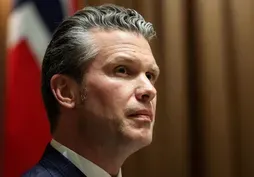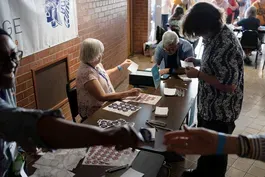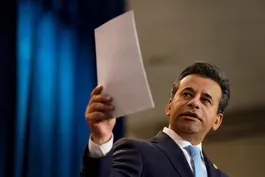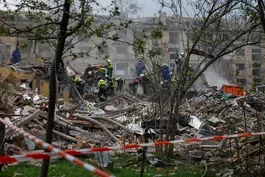
Utility assistance frozen after Trump fires program's staff
Clip: 4/24/2025 | 5m 8sVideo has Closed Captions
Utility assistance frozen after Trump administration fires program's staff
Money for heating and cooling assistance for those in need is on the line. As part of the cuts to the Department of Health and Human Services, the Trump administration reportedly fired the staff that runs the Low-Income Home Energy Program. Congress already approved funds for the program but with the staff gone, the allocated money is frozen. Amna Nawaz discussed more with Logan Atkinson Burke.
Problems with Closed Captions? Closed Captioning Feedback
Problems with Closed Captions? Closed Captioning Feedback
Major corporate funding for the PBS News Hour is provided by BDO, BNSF, Consumer Cellular, American Cruise Lines, and Raymond James. Funding for the PBS NewsHour Weekend is provided by...

Utility assistance frozen after Trump fires program's staff
Clip: 4/24/2025 | 5m 8sVideo has Closed Captions
Money for heating and cooling assistance for those in need is on the line. As part of the cuts to the Department of Health and Human Services, the Trump administration reportedly fired the staff that runs the Low-Income Home Energy Program. Congress already approved funds for the program but with the staff gone, the allocated money is frozen. Amna Nawaz discussed more with Logan Atkinson Burke.
Problems with Closed Captions? Closed Captioning Feedback
How to Watch PBS News Hour
PBS News Hour is available to stream on pbs.org and the free PBS App, available on iPhone, Apple TV, Android TV, Android smartphones, Amazon Fire TV, Amazon Fire Tablet, Roku, Samsung Smart TV, and Vizio.
Providing Support for PBS.org
Learn Moreabout PBS online sponsorshipAMNA NAWAZ: Money for heating and cooling assistance for those in need is on the line.
As part of the cuts to the Department of Health and Human Services earlier this month, the Trump administration reportedly fired the staff that runs the Low Income Home Energy Assistance Program, or LIHEAP.
That program helps about 6.2 million low-income households nationwide pay their home energy bills.
Congress already approved funds for the program for fiscal year 2025, but with the staff gone, the rest of the allocated money is currently frozen.
For more on this, we're joined by Logan Atkinson Burke, executive director for the Alliance for Affordable Energy.
That's a consumer and environmental advocacy group in the state of Louisiana.
Logan, welcome to the "News Hour."
Thanks for joining us.
LOGAN ATKINSON BURKE, Executive Director, Alliance for Affordable Energy: Thank you so much for covering this issue.
AMNA NAWAZ: So this is a program started by Congress back in 1981.
When we're talking about over six million households nationwide who use it, who are we talking about generally and where are they, geographically speaking?
LOGAN ATKINSON BURKE: Sure, these Reagan era block grants, these are incredibly powerful programs, really hit every kind of household across our country, but really focusing in on the elderly, on families with young children, and those who are disabled.
And the programs serve to help people pay to keep the lights on, especially during the summer and the wintertime.
These kinds of programs mean that, in the most dangerous part of the year, when it's incredibly hot or cold, that people can simply stay safe and healthy in their homes and then also meet their other basic needs.
AMNA NAWAZ: So, the program, to be clear here, wasn't cut, but the staff were fired.
So we know there's about $378 million left in the funds that Congress already allocated to the program.
With no staff there, though, what's going to happen to that money?
LOGAN ATKINSON BURKE: Well, that's the question that everyone is asking.
And, furthermore, what's going to happen next year?
These kinds of programs, they keep rates low for everyone, because, if people can't pay those utility bills, it means that those costs have to be covered elsewhere.
We're particularly concerned about states that don't have other kinds of safety net programs, because they are the ones who most likely need to keep these kinds of federal dollars coming into the state.
AMNA NAWAZ: The administration is saying the assistance will ultimately get delivered in some form.
Is it possible they will find another way to distribute those funds, just not through this program?
LOGAN ATKINSON BURKE: Well, the thing that's dangerous about that is, especially if they're thinking about accountability, the value of having a federal staff whose job it is to oversee these dollars is to make sure that every dollar is getting put to good use, getting put to reduce people's utility bills.
Without having that federal staff, we don't have the accountability and oversight that these kinds of programs are supposed to have.
AMNA NAWAZ: And, Logan, are there any legal questions around this move?
Is there a way for states to eventually still access those funds?
LOGAN ATKINSON BURKE: Well, that's another question.
We keep seeing programs like LIHEAP and others at the federal level getting slowed down or slow-walked.
And over and over, all we see is the opportunity for litigation, which then turns into more, is the Trump administration going to take this next step again?
AMNA NAWAZ: So in terms of the timeline of how these funds generally roll out, does the timing of these cuts right now, does that mean that people are already going to face trouble this summer paying for their cooling bills?
Or is it more likely to be an issue if nothing is distributed later this winter?
LOGAN ATKINSON BURKE: We're really concerned about the summertime.
Here in Louisiana, it gets extraordinarily hot.
And if our local community action organizations don't have the funds to support people through the summer, it gets people off-balance and unable to manage all of their other costs.
And so we really want to make sure that those dollars make it to the states as soon as possible.
AMNA NAWAZ: You know, Logan, the administration may argue here, this is a $4-billion-a-year program.
Maybe it's not an efficient or critical use of government funds for the administration to be helping people to pay their utility bills.
So what would you say to that?
LOGAN ATKINSON BURKE: I would say that utility costs are fundamentally housing costs.
And if we aren't making sure that people have the very basic needs to keep their lights on, it means that they're also -- they don't have the dollars to put to their other basic needs, like their rent or their mortgage or their food.
All of those costs are also going up.
There's no other mechanism to help people really make sure they can keep those lights on.
And so these programs are absolutely necessary to do that.
AMNA NAWAZ: That is Logan Atkinson Burke, executive director for the Alliance for Affordable Energy.
Logan, thank you so much for your time.
LOGAN ATKINSON BURKE: Really happy to talk to you.
Thank you.
The benefits and toll of rebuilding U.S. aluminum industry
Video has Closed Captions
The benefits and financial toll of rebuilding America’s aluminum industry (8m 35s)
Harvard scientist describes ICE detention, deportation fears
Video has Closed Captions
Russian-born Harvard researcher describes detention at ICE facility and deportation fears (7m 12s)
Hegseth has unsecured internet in Pentagon office for Signal
Video has Closed Captions
Hegseth reportedly has unsecured internet line in Pentagon office for Signal (4m 37s)
How lawmakers are responding to frustrated constituents
Video has Closed Captions
How lawmakers are responding to frustrated constituents at town halls (5m 18s)
New FDA commissioner on abortion medication restrictions
Video has Closed Captions
What the new FDA commissioner says about possible restrictions on abortion medication (2m 1s)
News Wrap: Trump asks SCOTUS to allow Pentagon trans ban
Video has Closed Captions
News Wrap: Trump administration asks Supreme Court to allow ban on trans service members (5m 20s)
Religious directives complicate care at Catholic hospitals
Video has Closed Captions
Religious directives at Catholic hospitals complicate emergency care for pregnant women (9m 11s)
Russian attacks on Kyiv complicate U.S. peace talks
Video has Closed Captions
Russian attacks on Kyiv complicate U.S. efforts to end war in Ukraine (3m 13s)
Providing Support for PBS.org
Learn Moreabout PBS online sponsorshipSupport for PBS provided by:
Major corporate funding for the PBS News Hour is provided by BDO, BNSF, Consumer Cellular, American Cruise Lines, and Raymond James. Funding for the PBS NewsHour Weekend is provided by...



















